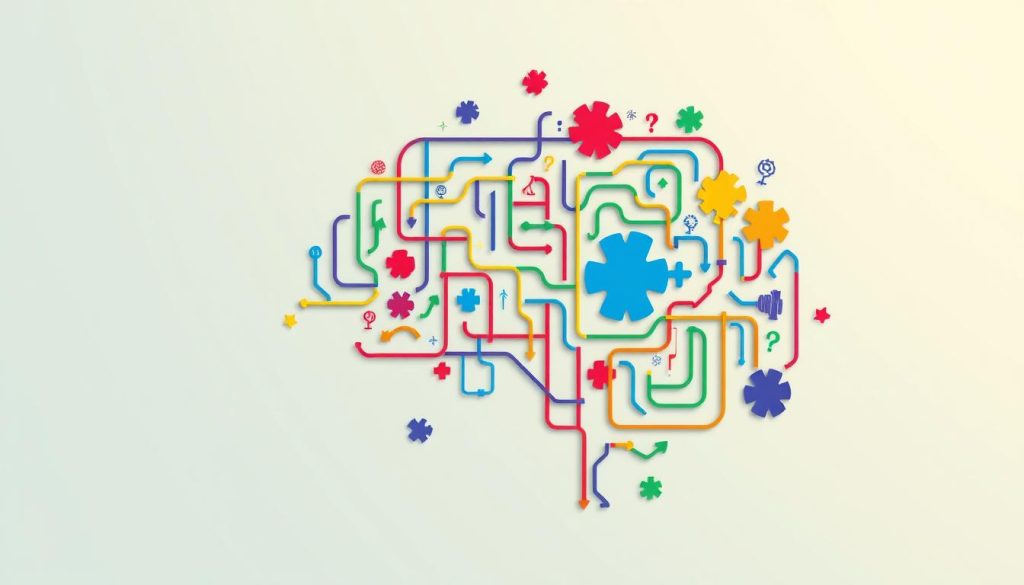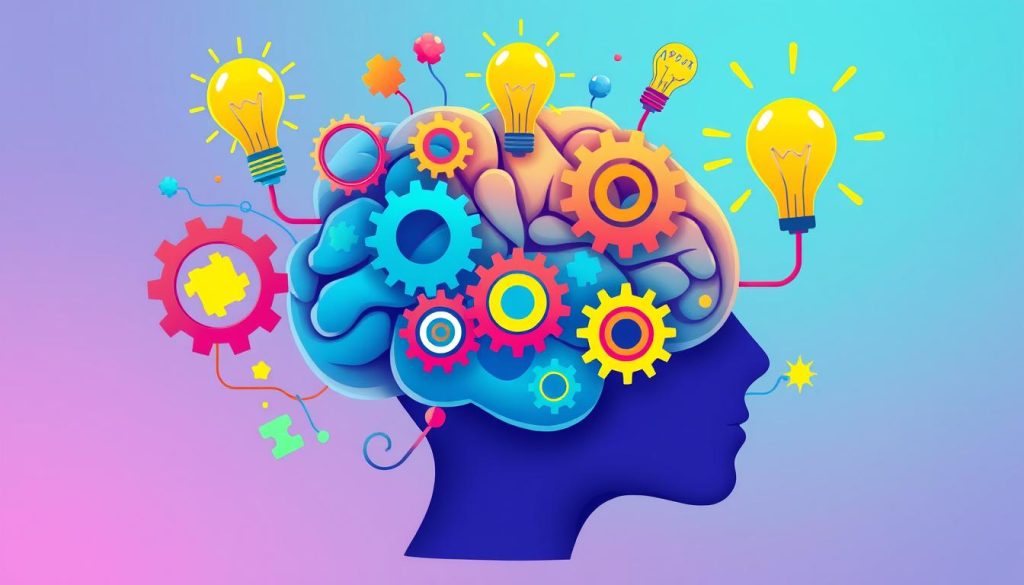Asperger’s syndrome has long been a topic of interest in the world of developmental disabilities. Many wonder about its relationship to autism spectrum disorder. This question has sparked debates among experts and families alike.
In recent years, the lines between Asperger’s and autism have blurred. The medical community now views Asperger’s as part of the autism spectrum. This shift has changed how we think about these conditions.
Let’s explore the link between Asperger’s syndrome and autism spectrum disorder. We’ll look at why this matters for diagnosis, treatment, and support. Understanding this connection is key to helping those with these developmental disabilities.
The Historical Evolution of Asperger’s Syndrome Classification
The journey of Asperger’s syndrome classification spans decades. It began with groundbreaking research and evolved through various diagnostic standards. This progression has significantly shaped our understanding of autism spectrum disorders.
Hans Asperger’s Original Research and Findings
In the 1940s, Hans Asperger studied children with unique social and communication patterns. He noted their strong language skills and special interests. Asperger’s work laid the foundation for recognizing a distinct form of autism.
Evolution of Diagnostic Criteria Over Time
The diagnostic criteria for Asperger’s syndrome changed as research advanced. Initially seen as separate from autism, it was later recognized as part of the autism spectrum. This shift reflected growing knowledge about developmental disorders.
| Year | Classification | Key Changes |
|---|---|---|
| 1980 | DSM-III | Introduced Pervasive Developmental Disorder |
| 1994 | DSM-IV | Added Asperger’s Disorder as distinct diagnosis |
| 2013 | DSM-5 | Merged Asperger’s into Autism Spectrum Disorder |
The DSM-5 Reclassification Impact
The DSM-5 reclassification in 2013 marked a significant change. It merged Asperger’s syndrome into the broader autism spectrum disorder category. This shift aimed to improve diagnosis accuracy but sparked debates about identity and support needs for individuals previously diagnosed with Asperger’s.
Is Asperger’s Syndrome Autism? Exploring the Diagnostic Shift

The autism community has seen a big change in how Asperger’s syndrome is seen. It’s now part of the autism spectrum disorder. This change has led to many discussions among experts and those affected by it.
The DSM-5, a guide for mental health professionals, brought about this change. It removed Asperger’s as a separate diagnosis. Now, it’s included in autism spectrum disorder.
This change aims to better understand autism. It shows that autism is a spectrum, with different levels and ways it shows up. People once diagnosed with Asperger’s now get a diagnosis of autism spectrum disorder.
This change has had a big impact. Some people who felt strongly connected to Asperger’s find it hard to accept the new label. But others see it as a step forward, helping more people get the support they need.
Even though there’s been some debate, this shift has also brought more attention and research to autism. It shows how complex neurodevelopmental conditions are. It also stresses the need for personalized approaches to diagnosis and support.
Key Characteristics of Asperger’s as Part of the Autism Spectrum
Asperger’s syndrome is now seen as part of the autism spectrum. It has unique features that affect how people interact, behave, and process information.
Social Communication Patterns
Those with Asperger’s often find social communication hard. They might miss social cues or struggle with unwritten rules. Talking can be tough, with a focus on specific topics.
Behavioral Traits and Interests
Restricted interests are a key sign of Asperger’s. People might know a lot about certain topics. They like routines and may not like changes in their day.
Cognitive Processing Differences
Cognitive processing in Asperger’s is different. Many are great at solving problems logically. But, they might find abstract ideas or doing many things at once hard.
| Characteristic | Description | Impact |
|---|---|---|
| Social Communication | Difficulty with social cues | Challenges in forming relationships |
| Restricted Interests | Intense focus on specific topics | Deep expertise in niche areas |
| Cognitive Processing | Unique thought patterns | Strong logical skills, possible struggles with abstraction |
Knowing these key traits helps us understand and support those with Asperger’s syndrome. It’s important to remember that each person’s experience is unique. Traits can vary a lot across the autism spectrum.
Understanding High-Functioning Autism vs Asperger’s Syndrome
The autism spectrum includes many conditions, with high-functioning autism and Asperger’s often confused. These terms are not the same, each with its own traits.
High-functioning autism is for those with average or above-average intelligence. They might find social interactions hard but can live independently. Asperger’s is now seen as part of the autism spectrum, not a separate diagnosis.
People with Asperger’s have strong language skills but struggle with social interactions. They often have intense interests and repeat behaviors. These traits are similar to high-functioning autism, leading to a change in how we diagnose.
| Characteristic | High-Functioning Autism | Asperger’s Syndrome |
|---|---|---|
| Language Development | May have early language delays | No significant language delays |
| Cognitive Abilities | Average to above-average IQ | Average to above-average IQ |
| Social Interaction | Difficulties in social settings | Struggles with social cues and norms |
| Special Interests | May have intense focus on specific topics | Often has narrow, deep interests |
Even though they are different, we now group them under autism spectrum. This change helps us better support and understand these individuals. It recognizes the common challenges they face in social interactions and behaviors.
The Role of Social Communication in Asperger’s Diagnosis
Social communication is key in diagnosing Asperger’s syndrome. People with Asperger’s face unique challenges in this area. These challenges affect their daily life and relationships. It’s important to understand these difficulties to provide the right support.
Verbal Communication Patterns
Those with Asperger’s often speak in a formal or pedantic way. They might use advanced vocabulary or struggle with conversation flow. Some may talk a lot about their interests, not noticing if others are listening.
Non-verbal Communication Challenges
Reading non-verbal cues is hard for those with Asperger’s. They might find it tough to understand facial expressions, body language, or tone of voice. This can lead to misunderstandings and social communication difficulties.
Social Interaction Difficulties
Social interactions can be complex for individuals with Asperger’s. They may find it hard to start or keep conversations going. They might struggle with understanding social norms and unwritten rules. Developing and keeping friendships can also be a challenge.
- Initiating or maintaining conversations
- Understanding social norms and unwritten rules
- Developing and sustaining friendships
- Recognizing others’ emotions or perspectives
| Communication Aspect | Typical Challenges | Potential Strategies |
|---|---|---|
| Verbal communication | Formal speech, monologuing | Social skills training, conversation practice |
| Non-verbal cues | Difficulty interpreting expressions | Visual aids, explicit teaching of cues |
| Social interaction | Trouble with unwritten rules | Social stories, role-playing exercises |
It’s important to recognize these social communication patterns for accurate diagnosis and support. By understanding these challenges, we can help individuals with Asperger’s better navigate social situations. This can improve their quality of life.
Sensory Processing and Environmental Responses

People with Asperger’s face special challenges with sensory processing. Their brains see the world in a unique way. This can lead to sensory issues that affect their daily lives.
These sensory differences can show up in many ways. For instance, some might find loud noises too much. Others might look for intense sensory experiences. This makes everyday places hard to navigate.
Common sensory issues in Asperger’s include:
- Sensitivity to bright lights or specific colors
- Difficulty tolerating certain textures in clothing or food
- Heightened awareness of background noises
- Unusual reactions to smells or tastes
It’s key to understand these sensory differences. By recognizing and meeting their needs, we can help them feel more at ease. This reduces the risk of sensory overload.
| Sensory Domain | Possible Sensitivities | Accommodation Strategies |
|---|---|---|
| Visual | Fluorescent lights, bright colors | Dimmer switches, soft lighting options |
| Auditory | Loud noises, multiple conversations | Noise-canceling headphones, quiet spaces |
| Tactile | Certain fabric textures, light touch | Seamless clothing, weighted blankets |
| Olfactory | Strong perfumes, food odors | Fragrance-free policies, good ventilation |
Restricted Interests and Repetitive Behaviors in Asperger’s
People with Asperger’s often have restricted interests and repetitive behaviors. These traits shape their daily lives and relationships. Let’s explore how these features manifest in individuals on the autism spectrum.
Special Interest Areas
Many with Asperger’s develop intense focus on specific topics. These special interests can be incredibly detailed and all-consuming. Some common areas include:
- Technology and computers
- Science and mathematics
- History or geography
- Collecting specific items
- Music or art
While these interests can lead to expertise, they may limit social interactions. People might struggle to engage in conversations outside their preferred topics.
Routine and Pattern Dependencies
Repetitive behaviors are another key feature of Asperger’s. These can include:
| Behavior | Impact |
|---|---|
| Strict daily routines | Provides comfort but can cause stress if disrupted |
| Repetitive movements | May help with self-regulation but appear unusual to others |
| Rigid thinking patterns | Can lead to difficulties adapting to change |
These restricted interests and repetitive behaviors often serve as coping mechanisms. They provide a sense of order and predictability in a world that can feel chaotic to those with Asperger’s.
Cognitive Strengths Associated with Asperger’s Syndrome
Asperger’s syndrome is a neurological condition on the autism spectrum. It often brings unique cognitive strengths. People with this condition show exceptional abilities in certain areas. This makes them stand out in school and work.

Those with Asperger’s are known for their attention to detail. They can focus intensely on what interests them. This focus helps them become experts in specific fields.
They also have exceptional memory. Many can remember lots of details and information, mainly in their areas of interest. This skill is very useful in school and certain jobs.
- Strong logical and analytical thinking
- Ability to recognize patterns and solve complex problems
- Creative and original thought processes
- Exceptional long-term memory
Asperger’s syndrome often leads to creative problem-solving. This can result in new solutions that others might miss. Using these strengths can lead to big achievements in science, tech, and the arts.
Educational Considerations and Support Strategies
Students with Asperger’s syndrome often need special help to do well in school. Schools can use many ways to help these students succeed.
Academic Accommodations
Effective academic accommodations can really help. This might include extra time for tests, quiet places to work, or written instructions. Some students also benefit from help with note-taking or using technology in class.
Social Skills Training
Social skills training is key for students with Asperger’s. This can include role-playing, group activities, and learning about social cues. Many schools have special programs or work with therapists to offer this support.
Learning Style Adaptations
Teachers can adjust their teaching to fit the learning styles of students with Asperger’s. This might include:
- Using visual aids and diagrams
- Breaking tasks into smaller steps
- Providing clear, concrete instructions
- Allowing for breaks during long lessons
By using these strategies, schools can create a supportive environment. This helps students with Asperger’s reach their full ability. The aim is to provide support that meets both academic and social needs, preparing them for success in school and beyond.
Adult Life with Asperger’s: Challenges and Opportunities
Living with adult Asperger’s comes with its own set of challenges and chances. Many face issues at work due to trouble with social communication and being too sensitive to sounds and sights. These problems can make it hard to do well at their job and get along with coworkers.

- Understanding unwritten social rules
- Interpreting nonverbal cues
- Adapting to changes in routine
- Managing sensory overload in busy office environments
Adults with Asperger’s find relationships tricky. They might struggle to pick up on emotional signals or share their feelings. This can cause confusion and make it tough to build close bonds.
But, many adults with Asperger’s do well in their careers and personal lives. Their special way of seeing things and paying attention to details can be a big plus in fields like tech, science, and the arts.
| Challenges | Opportunities |
|---|---|
| Social communication difficulties | Unique problem-solving skills |
| Sensory sensitivities | Intense focus on interests |
| Difficulty with change | Attention to detail |
| Misunderstanding social cues | Creative thinking |
With the right support and understanding, adults with Asperger’s can really shine in their personal and professional lives. Employers and loved ones who get and value their unique qualities can help make places where everyone can succeed.
Treatment and Support Options for Asperger’s Syndrome
People with Asperger’s syndrome can find help through various treatments and support systems. These methods aim to boost social skills, improve communication, and enhance life quality.
Therapeutic Approaches
Therapy is key in managing Asperger’s syndrome. Cognitive-behavioral therapy helps change thought patterns. Speech and language therapy enhances communication skills.
Occupational therapy aids in daily tasks and handling sensory issues.
Behavioral Interventions
Behavioral interventions teach specific skills and reduce tough behaviors. Social skills training helps with social interactions. Applied Behavior Analysis (ABA) uses positive reinforcement for good behaviors.
| Intervention | Focus Area | Benefits |
|---|---|---|
| Social Skills Training | Social Interaction | Improved communication, friendship building |
| ABA | Behavior Modification | Reduced challenging behaviors, skill development |
| Cognitive-Behavioral Therapy | Thought Patterns | Better emotional regulation, anxiety management |
Support Groups and Resources
Support groups offer emotional support and practical tips. They help connect with others who face similar challenges. Online forums, local meetups, and national organizations are great resources for info and community.
Choosing the right mix of treatments and support can greatly improve lives with Asperger’s syndrome. It’s vital to work with healthcare experts to create a personalized plan. This plan should meet specific needs and goals.
The Neurodiversity Perspective on Asperger’s

The idea of neurodiversity has changed how we see Asperger’s syndrome and autism. It views brain differences as natural, not as disorders. This new view is helping us understand and support people with autism better.
Neurodiversity supporters say Asperger’s is not something to be fixed. It’s a unique way of seeing the world. This thinking has made us more open to helping those on the autism spectrum.
The movement highlights the strengths of those with developmental differences. For those with Asperger’s, these strengths include:
- Exceptional focus and attention to detail
- Strong analytical skills
- Unique problem-solving abilities
- Deep knowledge in areas of interest
By accepting neurodiversity, we can make spaces that value everyone’s contributions. This view fits with the changing views on neurodivergent conditions. It moves us from strict labels to a broader understanding of human diversity.
Looking at autism through neurodiversity opens up new ways to support and empower those with Asperger’s and other neurodivergent traits.
Future Directions in Asperger’s and Autism Research
The field of autism research is growing fast. Scientists are learning more about this complex condition. They are focusing on several key areas to better understand autism spectrum disorders, including Asperger’s syndrome.
One exciting area is studying the genetic factors of autism. Researchers are using new technologies to find specific genes linked to autism. This could lead to earlier diagnosis and more effective treatments for those on the spectrum.
Brain imaging studies are also promising. Scientists are using advanced scans to study the brains of people with autism. These studies aim to find out how autism affects brain structure and function. They hope to gain new insights into how individuals with autism process information and interact with their world.
As research continues, we can expect more personalized support and treatment. By understanding each person’s unique traits, professionals can create tailored strategies. This approach has the power to greatly improve outcomes and help those on the autism spectrum reach their full abilities.
FAQ
Q: Is Asperger’s syndrome considered autism?
A: Yes, Asperger’s syndrome is now seen as part of autism spectrum disorder (ASD). The DSM-5, released in 2013, merged Asperger’s into the broader autism spectrum diagnosis.
Q: What are the main characteristics of Asperger’s syndrome?
A: Asperger’s syndrome is marked by social communication challenges, restricted interests, and repetitive behaviors. People with Asperger’s often have average to above-average intelligence and strong language skills.
Q: How does Asperger’s differ from high-functioning autism?
A: Asperger’s and high-functioning autism share many traits and are often used the same way. The main historical difference was in early language skills. But now, both are under the autism spectrum disorder umbrella.
Q: What are some common sensory issues in Asperger’s syndrome?
A: Sensory issues in Asperger’s can include being too sensitive or not sensitive enough to sounds, lights, textures, or smells. Some might feel overwhelmed, while others seek intense sensory experiences.
Q: Are there specific cognitive strengths associated with Asperger’s syndrome?
A: Yes, people with Asperger’s often have strong memory, attention to detail, logical thinking, and pattern recognition. These skills are valuable in science, technology, and mathematics.
Q: What educational support is available for students with Asperger’s syndrome?
A: Students with Asperger’s can get academic accommodations, social skills training, and learning style adaptations. IEPs or 504 plans help address their needs and provide classroom support.
Q: How does the neurodiversity perspective apply to Asperger’s syndrome?
A: The neurodiversity view sees Asperger’s as a natural part of human neurology, not something to be cured. It promotes acceptance and celebration of neurological differences while supporting those who need it.
Q: What treatment options are available for individuals with Asperger’s syndrome?
A: Treatments for Asperger’s include behavioral interventions, social skills training, cognitive behavioral therapy, and occupational therapy. Support groups and resources help individuals and families cope with the condition.


















